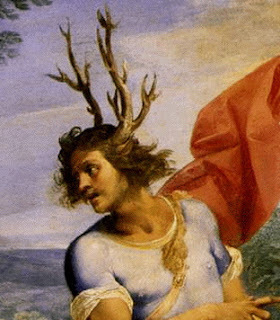ethics
- avoid placing an unfair burden on rural drivers, who generally must drive further to work and school, and earn less than their urban counterparts; and
- ensure Americans that the GPS devices that would track mileage are not also used inappropriately by government to track the locations and movements of citizens.
The Ethics of Automation: Poetry and Robot Priests
In terms of ethics and law: who has access to the information confessed, and what is the legal status of that confession? Is there anything like the privilege of confidentiality enjoyed by clergy who hear private confessions from their parishioners?
“The making of things is in my heart from my own making by thee; and the child of little understanding that makes a play of the deeds of his father may do so without thought of mockery, but because he is the son of his father.”
Might it be possible for us also to make sentient life in imitation of God "without thought of mockery," and, if so, might it be that those lives we make could write poems and become priests? As anyone who has read Tolkien's myth knows, this raises a new set of ethical questions that now have to be resolved.--J.R.R. Tolkien, Silmarillion, p 43
*****
Update, 22 May 2018: Irina Raicu just published a very thoughtful reply to this, entitled "Parenting, Politeness, Poets, and Priests" at the Markkula Center for Applied Ethics at Santa Clara University. Her article is very much worth the time it will take you to read it. You may find it here.
What Thucydides Can Teach Us About Imperial Overreach
"As we dwell in our golden, Athenian age of military and economic might, perhaps we should learn another lesson from the ancients as well. Aristotle tells us that a virtuous soul is not a soul without fear, but one that fears only the right things; and it is not moved by fear, because it tempers it with wisdom. In the end, the loss of virtue may be more dire than the loss of geopolitical prominence."You can read it all here.
College Football and Moral Education
Whenever I read an article in the local paper about a local talented high school athlete who has signed with a college sports team, I wonder why we don't report that a local talented debater, chess expert, or math student just made it into Harvard or the University of Chicago on the basis of her talent. It makes me wonder: Do we not care about intellectual ability as much we care about physical prowess?
In 1908 Harvard Philosophy professor Josiah Royce published an essay entitled "Football and Ideals." The essay is over a century old, but the topic and the ideas sound like they could have been written yesterday. Royce writes, "Football is at present a great social force in our country. It has long been so. Apparently it is destined to remain so." So far, this is correct.
In Royce's time football was still largely a college sport. (The NFL was founded twelve years later.) Just as college sports in the United States do today, it drew big crowds. Just as in our time, football had its scandals: severe injuries among players; hooliganism among the crowds; and unethical behavior among players off the field and among fans and gamblers.
And just as in our time, supporters of the sport claimed that football did more social good than harm.
In his essay, Royce takes all of this seriously. Any social force this great deserves to be examined, Royce says, in order to determine what social goods it provides, and at what cost. Only a few play, but all of us are affected by the sport. He puts it like this:
"Football must be estimated as to its general relations to the welfare of society, just as Standard Oil, or just as the railway management which results in killing a larger proportion of railway passengers in our country than in other countries, must be estimated; it must be judged by non-experts, precisely in so far as it influences their great common social concerns."Royce was in one sense a non-expert inasmuch as he was a professor, not a college athlete; but in another sense he was an expert because he had devoted much of his research to this question of ethics and the common good. Royce held that the aim of our moral lives is the fostering of loyalty, and that we can see this in a range of social institutions. He wasn't arguing that we should aim for small and local loyalties, though, but for loyalties that, though they begin and are expressed locally, develop into a broad agape-like loyalty that includes all people.
We often hear this expressed in similar terms today when proponents of college sports say that participation in sports fosters virtues like teamwork, or school spirit.
I think participation in athletics actually can do even more than this. As an educator, I have noticed that college athletes are often some of my most disciplined students. In general, they wake up early, take care of their bodies, and get their work done. There are exceptions, of course, but this has been the case with most of my student-athletes, anyway. Perhaps this is because I teach philosophy, and the weak students shy away from it because it is a difficult subject with no obvious cash value for their lives. In any event, my student athletes generally keep up the "student" part of that title fairly well. Being an athlete can provide numerous benefits for a student.
But this is only a small part of the question, isn't it? Royce reminds us that the question we are asking is not "Does playing football help the student-athlete?" but "Does football on campuses make us and our communities better?" In other words, this is not a question about the athlete but about the spectators. It is really a question about us.
This question is not a soft, squishy, depends-on-what-you-mean question. Royce has something very specific in mind: does the example of others' athleticism make you more ready to "go and do likewise," or does it merely thrill you? Or does it even sap your desire and ability to demonstrate similar excellence and loyalty?
Royce says that "if a man has only taught you to cheer him, he has so far only amused you," and if football has only allowed you to "let off steam" without making you "more practically devoted to your own tasks," then it has not made you better but possibly it has even stripped you of your moral strength.
This requires honest self-assessment. When you watch football, or other athletic contests (like the World Cup) are you becoming a better person, one more able to devote yourself to the tasks that strike you as worthy of your energies? Are you developing a deeper loyalty to others, and deeper respect for the loyalties of others, or does fandom in fact make those goals more difficult to attain?
Note that this is not a critique of football as a game, nor even of college sports as an institution. It is a critique of the spectators, and of the effect sports have on us when we watch them. Are they making us more fit for life together, or are they in fact making us less so?
I will not try to answer that question for now. Royce's conclusion, in his time, was that the conditions of spectating made football unfavorable "to the best moral development of our youth." College sports may be great for the players, but not for those who do not play, he said.
It's not obvious to me that things are now as they were then, but it is obvious to me that football has become a greater social force than it was in Royce's time a century ago. If so, it merits our constant examination. And if we are honest, and good, we will not be content with vague observations about building teamwork in the players. After all, the players never play alone, but always with a crowd. It is not just two teams who play a football game, but those two teams play together with the combined energies of the crowd, and each influences the other.
This should be obvious to us from the simple fact of team selection. Coaches select players from the general body of students (or potential students) in order to win games for the school, not in order to help those select few become better people. At many high schools and colleges, coaches are considered teaching faculty. But there is this important difference between sports teams and academic classes: academic teachers are not permitted to choose which students they will educate, but coaches generally have free rein to eliminate from their tutelage any whom they choose. So while college sports may be similar to classes (inasmuch as they purport to teach) they differ significantly in this respect.
For myself, I am not opposed to college sports. If anything, I would like to expand them to include all students as players, not merely as spectators. After all, if there are moral benefits to playing sports, then why would any institution of higher education not want to urge all of its students to gain that benefit by playing?
Newspapers, Sports, and Healthy Societies
I have caught some of de Tocqueville's enthusiasm for the way journalism can pump the lifeblood of a free society. Subscription to one's local paper is an act of patriotism. It is a commonplace of contemporary life in the United States to say that our freedom is won and preserved by soldiers. But this is, at best, only partly true, and history shows that armed men can both help and hinder freedom. Armies may be helpful, but there are other services that are more essential to freedom: lawyers, educators, and journalists.
But my idealism concerning journalism contends with my cynicism. Publishers of news are, after all, publishers; and publishers must pay their bills, too. They've got to sell ads, which means they can't risk offending those who buy ads. Right now we are in one of those times when there are a very few companies that own very many of the news outlets, and it's hard to imagine that doesn't affect both the slant of news stories told and the way those stories are selected and omitted in the first place. And they've got to print what we want to buy.
All this is a prelude to something else I have in mind to write over the next few days, about the relationship between sports and education, a question at least as old as Plato's Republic. I begin here by noting the role sports play in our news. How much of television news is devoted to sports? On any given day, a third of my local newspaper reports local and national and international sports stories.
This raises several questions for me. Why does this hold such fascination for us? And is our fascination with sports healthy?
Since some of what I will say about sports will seem critical, let me point out that I'm not opposed to sports. I'm a member of a society devoted to philosophy and sport, and I love outdoor recreation. I swam for the varsity team in my high school; I played club ultimate in college; I encouraged my kids to play various sports like flag football, gymnastics, little league, and soccer throughout their youth; and I am now the faculty advisor for my college's martial arts club and I am a U-19 recreational league soccer coach in my city. Sports are important; but that does not mean that all the attention we give to sports is well given.
So, once again, I begin with noticing the attention our newspapers give to sports. Plainly we need our journalists to attend to judges and legislators, to governors and police departments, because all of those are public offices endowed with public trust. Journalists are one of the main ways we prevent the violation of that trust. So what about sports? Is the presence (we could even say the domination) of sporting news merely a distraction from the real work of journalism? Is it a necessary evil to get us to buy the paper and to support the important democratic work of reporting?
One could argue that we need newspapers to watch athletes and coaches and owners of athletic teams to ensure that their influence on society is not unjust. But this cuts both ways: were it not for the attention we already give to sport, the influence of athletes, coaches, and owners would be minimal. The fact that newspapers report so much about sport is the symptom; we ourselves, and our attention to sport are the cause. It is not something called "sport" that is at issue here, nor the leaning of the journalists, but rather, the attention we ourselves pay it. If newspapers are physicians of our civic life, then we are the patient; and the doctor can only do so much to make us healthy if we will not do our part, too.
20,000: Two Stories Of Water Pollution In The Dakotas
The first was a story about an oil pipeline leak in which 20,000 barrels of crude oil contaminated over seven acres of farmland. The Argus reports that in major oil-producing states like North Dakota oil spills must be reported to the state, but state law does not mandate the release of this information to the public. In other words, the state is free to keep this news quiet. One has to assume that the state legislators who wrote that law thought it was in the public interest to keep news of toxic spills quiet. It's better for us not to know about such things, I guess.
Anyway, the Argus lets us know that some state officials think there's no cause for concern: "state regulators say no water sources were contaminated, no wildlife was hurt and no one was injured." Oh, good.
The second story is about the disposal of some 20,000 cattle that died in a surprisingly early and heavy snowstorm earlier this month. This is a devastating loss for ranchers across western South Dakota. It represents an enormous financial loss, and it also creates a very difficult cleanup problem. The best solution for disposal of all the carcasses so far has been to dig two large pits. The Argus reports that there are strict regulations concerning the depth and soil of the pits.
According to the Argus, the reason for the pits is to make sure the dead cattle don't contaminate streams.
Which makes me wonder why there is so little concern for the oil spill in North Dakota. Obviously there is an important difference between bacterial and viral infections entering streams, on the one hand, and oil entering streams on the other hand. But surely both represent serious health hazards?
We are left with a peculiar contrast: a few cattle on the ground - something that happens in nature all the time - are a serious threat to the water, while a million gallons of crude oil spread across seven acres of farmland (presumably some rain falls there and washes into streams?) is barely worth telling the public about.
*****
Update: Since a number of people have asked me just what happened to the cattle in South Dakota, I am posting this link that I found to be a helpful reply to some questions about the storm and the loss of the cattle.
Leopold On Sport And Ethics
- Aldo Leopold, A Sand County Almanac
Pornography and Prayer
"Repetitive viewing of pornography resets neural pathways, creating the need for a type and level of stimulation not satiable in real life. The user is thrilled, then doomed."Thankfully, "doomed" may be an overstatement. As William James and so many others remind us, our habits make us who we are, so we may be able to form new habits to supplant or redirect old ones. I'm no psychologist, but it seems obvious to me that what we hold in front of our consciousness will synechistically affect everything else we think about and do. So it is no surprise that the author of this WSJ article reports that viewing porn may lead to viewing women as things rather than as people.
To put it differently, everyone worships something, and what we worship changes us. This is one of the good reasons to engage in prayer and worship that are intentional. (On a related note, it's a good reason to forgive, too: forgiveness keeps us from internalizing the pain others have caused us, where it can fester and devour us from within.)
(If you read my writing with any regularity you will recognize these as themes I frequently return to. If you're interested, I've written more here and here.)
One of the problems of philosophy of religion has been to try to identify that which certainly deserves our worship. This quest for certainty has often (in my view) distracted us from the more important work of liturgy, wherein we acknowledge our limitations, including our uncertainty. A good liturgy involves worshiping what we believe to be worth worshiping, while acknowledging our own limitations. After all, if worship doesn't include humility on the part of the worshiper, it is probably self-worship.
Another way of putting this is in terms of love. Charles Peirce wrote about this more than a century ago. There are many forms of worship, many kinds of prayer. Without intending to demean the prayer and worship of others, Peirce nevertheless offers what seems to him to be worth our attention: agape love, the love that seeks to nurture others:
"Man's highest developments are social; and religion, though it begins in a seminal individual inspiration, only comes to full flower in a great church coextensive with a civilization. This is true of every religion, but supereminently so of the religion of love. Its ideal is that the whole world shall be united in the bond of a common love of God accomplished by each man's loving his neighbour. Without a church, the religion of love can have but a rudimentary existence; and a narrow, little exclusive church is almost worse than none. A great catholic church is wanted." (Peirce, Collected Papers, 6.442-443)Notice that Peirce uses a small "c" in "catholic." He wasn't trying to proselytize for one sect; quite the opposite. He was trying to proclaim the importance of a church - that is, of a community that shares a commitment to communal worship - of nurturing love.
I am not trying to moralize about pornography. In fact, I see some good in pornography, just as I recognize goodness in the aromas coming from a kitchen where good cooking happens. Pornography probably speaks to some of our most basic desires and needs, for intimacy, affection, attention, and love, as well as our simple, animal longings.
Still, like aromas from a fine kitchen, porn stimulates us without nourishing us. And by giving it too much attention we may be training ourselves to scorn good nutrition. The WSJ article suggests giving up the stimulation as a means of getting over it. I think this is incomplete without a redirection of the attention to what does in fact nourish us. Prayer and worship that refocus our conscious minds on what really merits our attention can prepare us to receive - and to give - good nutrition. That is, by shifting some of our attention from cherishing need-love to cherishing gift-love - from the love that uses others to the love that seeks their flourishing - we might make ourselves into the kind of great lovers our world most needs.
Surveillance and Virtue
These are signs that our technology is racing ahead of us. It is easier to create new machines for surveillance than it is to devise a set of rules for ethical use of those machines. The problem of Google Glass is not something altogether new; but the technology sharpens the ethical issues: can I wear it in the locker room at the gym? Can I wear it while talking with the police, or border guards? Can I wear it at a party where co-workers are drinking?
The problem of drones is similar: we have increased our ability to watch others without being watched. As Foucault observed, this is one of the main functions of the prison, a relatively modern invention. The prison is an architectural technology that allows us to watch over our fellow citizens without having them watch us.
 |
| Be kind; love one another. |
We are unlikely to slow our own technological progress, so we must devote equal energy and resources to ethical reasoning and to ethical living. Here is where I suggest we start:
First, if you're ashamed of someone seeing what your community is doing, don't do it. It is one thing to protect trademarked secrets and patented methods of production, to enjoy the economic benefits of one's creativity. But if your reason for concealing your business process is that you know I won't buy your product if I know how it's made, you deserve to be exposed because you are manipulating me by concealing information that would affect my decisions.
Second, devote yourself to respecting the privacy and dignity of others. Do this not just for others, but for yourself. We know ourselves to be less than we wish we were; and we know that the social impulse is balanced in our species by a desire to do some things alone, unobserved, or only in intimate company. To expose those things unbidden is to dominate. It is crass, and unkind. If you do not respect others, the technologies of surveillance will become your Ring, and you will destroy your own soul.
At times these two principles will be in conflict with one another - underscoring the importance of continued ethical reasoning. We can't simply fall back on facile rules. We have got to keep thinking, and thinking hard, together. The simple principles, however, can provide a good place to start: do not attempt to dominate or destroy others. Put positively: love one another.
C.S. Lewis On Astro-Ethics
C.S. Lewis was well ahead of his time in considering these questions. As Matthew Dickerson and I have discussed at some length, Lewis's novel Out Of The Silent Planet takes up questions like these. Lewis worried that our stories and myths about space exploration made aliens into monsters and made us into conquering heroes, when the facts could really be quite the reverse. He was not sanguine about the likelihood that we would treat other species ethically:
“We know what our race does to strangers. Man destroys or enslaves every species he can.Civilized man murders, enslaves, cheats, and corrupts savage man. Even inanimate nature he turns into dust-bowls and slag-heaps….I therefore fear the practical, not the theoretical, problems which will arise if ever we meet rational creatures which are not human.”*
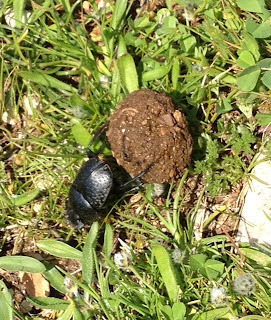 |
| We often make ethical decisions based on appearances, but resemblance to us shouldn't be the basis for considering other species to be rational agents or patients. |
His prescription must have seemed wildly impractical, namely that we begin preparing ourselves to encounter other sentient species by teaching ourselves that they may be every bit as worthy of life and God's love as we. One need not believe in God to see the significance of such a decision, since it amounts to deciding that other species have claims to rights that are every bit as strong as our own. Here is Lewis again:
"What I do know is that here and now, as our only possible practical preparation for such a meeting you and I should resolve to stand firm against all exploitation and all theological imperialism. It will not be fun. We shall be called traitors to our own species. We shall be hated of almost all men; even of some religious men. And we must not give back one single inch. We shall probably fail, but let us go down fighting for the right side. Our loyalty is due not to our species but to God. Those who are, or can become, his sons, are our real brothers even if they have shells or tusks. It is spiritual, not biological, kinship that counts.” **
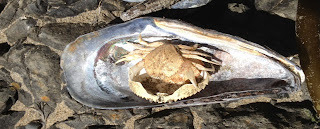 |
| "Even if they have shells or tusks" |
*(“Religion and Rocketry,” available here)
**(“Shall We Lose God In Outer Space?” Great Britain: SPCK, 1959. 10) Emphasis added.
The Other Drones Problem: The Tragedy of the Unexplored Commons
But there is another ethical issue related to UAVs that doesn't have to do with war. Or, if it does, it has to do with a "war against crude nature."
The technologies we invent in wartime don't go away when the conflicts end. Already, UAVs are being deployed for a number of other uses, and we can expect their uses to increase. I'm no flag-waving Luddite here. The things we invent can be put to diverse uses, some helpful and some harmful. But if we care about promoting the helpful uses, we'll need to be intentional about that.
UAVs are a brilliant platform for remote-sensing technologies. They can cover a lot of ground and stay aloft for a long time. Drone aircraft are adding to our ability to conquer unknown spaces. If you've used Google Maps to explore places you've never been before, you know what an aesthetic boost and letdown this can be: it's a boost to see what you've never seen, and at the same time, we find ourselves sharing Aldo Leopold's lament in "The River of the Mother of God": the unknown places are being replaced by maps, and our deep genetic need to explore runs up against the feeling that everything has already been seen. When I lived in Madrid, I tried to make places like the Retiro park my places of natural exploration and solitude, but I couldn't escape the feeling that I was treading where millions of others had already trod.
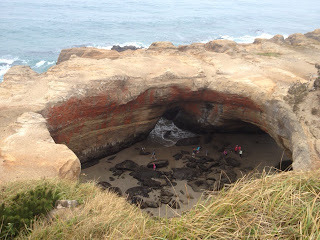 |
| We have a deep need for exploration, and so we need places that feel unexplored. |
But that is a small worry compared to the bigger issue of the world's oceans and natural resources. For the whole history of our species we have been able to act as though the world contained unlimited resources. Our species is an explorer species. We have "restless genes," as a recent National Geographic article put it.
Gone is the age of Hemingway's Old Man and the Sea. We no longer take to the seas in small craft and fish commercially with handlines. The last century has pushed fishing fleets thousands of miles from the places where they will ultimately bring their catch to market. We can no longer treat the oceans as limitless resources; we are fishing them out, and some species may collapse under the pressure and never come back.
In the race to find the last remaining schools of fish, we are beginning to use UAVs to scour the seas. Where fishermen once looked for birds circling schools of sardines, robot airplanes now skim the waves and do the searching for us.
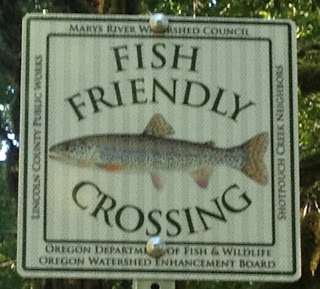 |
| At the crossroads |
Ethicists and game theorists refer to this as the "tragedy of the commons": if we each only take resources in proportion to what we can use, the resources can be shared indefinitely. But if some of us take more than our share of the "commons" or the resources, they will have a short-term gain at the expense of the long-term gain of everyone.
The STEM fields (Science, Technology, Engineering, Mathematics) are brilliant, and wonderful. New technologies give us new access to the world, and they can save and improve lives. But they lack the ability to regulate themselves, which is why as the STEM fields grow, we need the humanities (and their critiques of technology) to grow with them. If we are not careful, new technologies can also permit us to do great harm to our common world - and to ourselves. If fish seems cheap and plentiful, stop to ask where it came from, and whether that source is sustainable. If it's not, vote with your dollars and eat something else.
The Moral Issue Of Land
"[The prince] is to give his sons their inheritance out of his own property so that none of my people will be separated from his property." (Ezekiel 46.18)
 |
| Central Oregon |
And this, written by Alan Paton. His younger Jarvis (in Cry, the Beloved Country) also writes prophetically about South Africa. What he says could have been written about any number of places, though:
"It is true that we hoped to preserve the tribal system by a policy of segregation. That was permissible. But we never did it thoroughly or honestly. We set aside one-tenth of the land for four-fifths of the people. Thus we made it inevitable, and some say we did it knowingly, that labour would come to the towns. We are caught in the toils of our own selfishness....No one wishes to make its solution seem easy....But whether we be fearful or no, we shall never, because we are a Christian people, evade the moral issues."As a child I thought prophets were people who predicted the future, or who spoke things God wanted to say, like spokespeople. As I've grown older, my notion of prophets has expanded to mean those people who disrupt our quotidian secular and economic concerns in order to remind us that love and justice may and must constrain our actions. What could be more important than that?
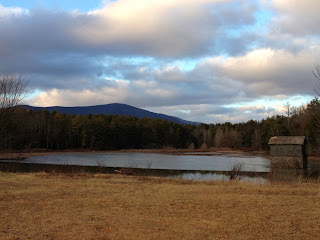 |
| Zena Reservoir and Overlook Mountain |
The question I am pondering this morning: What do love and justice require of us when it comes to land ownership?
This question is made more poignant as our state legislature is considering eliminating perpetual conservation land easements. One argument against them is that it seems unreasonable to put limitations on future people. We may rightly ask: can we consider those people who do not yet exist - and who therefore may never exist - as factors or agents in our moral reasoning?
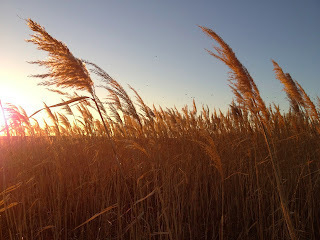 |
| Dakota prairie |
And yet every time we consume a non-renewable resource we are making an irrevocable decision about what the land will yield for perpetuity. Land easements may be one way to offset the effects of our other decisions, and they are at least reversible if the future proves them foolish.
Jarvis correctly diagnoses us: when we think about the future, frequently we are moved by fear. Isn't that why the prince Ezekiel spoke of was tempted not to give up his land?
I also find that when I think about the future, I am also motivated by love, and that love is perhaps my strongest, my most angelic impulse. I save, teach, build, conserve, and create for my children, and for others like them. I may not be able to give them a better world, but I do feel - I admit it is, at its base, a feeling - that I owe them at least as good a world as I received.
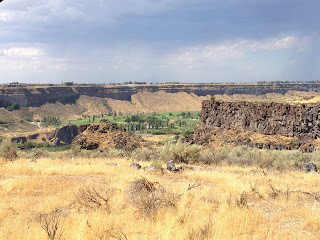 |
| Twin Falls, Idaho |
The Idolatry of Fear
Now: when fear becomes the guide for our actions, we should ask whether that fear deserves to be at the center of our attention.
Because what resides at the center of our attention starts to shape us. I don't mean it remakes us completely. I mean that what we mentally caress and cherish will affect our ethical decisions. The inward life has outward consequences.
Some fear is prudent. It is prudent not to stand on mountain ridges or under trees during thunderstorms. But if we live in constant fear of lightning, something has gone wrong. Either we live in the wrong place, or lightning has taken too central a role in our minds. Lightning becomes a monster, a demigod, a perpetual danger that stunts our growth and keeps our heads down.
The same could be said when we fear our neighbors: either we live in the wrong place, or we give too much credence to potential dangers and crowd out from our consciousness the potential joys of human fellowship. So our neighbors become monsters and we become their victims, and we worship them as fearful gods whom we come to despise.
What is the antidote to the idolatry of fear? Someone once said "perfect love drives out all fear." If I can conceive of my neighbor not as a monster but as someone worth loving--even to a small degree--then I have begun to let love -- philia, agape* -- dwell at the center of my consciousness. And I can begin to lift my head, just a little.
****
* Philia can mean "love," or "friendship." The latter books of Aristotle's Nicomachean Ethics give a thoughtful treatment of philia. Among his insights there, Aristotle says that where there is philia, there is no need for laws. Like philia, the word agape can be translated as "love." Charles Peirce used this word to describe the kind of love that seeks the good of the beloved (you can see more here and also in the Gospel of John) and distinguishes this from eros, the love that seeks the good of the lover.
The Ethics of Hunting
Just as there are many versions of the myth, so there are many interpretations, and many things that Actaeon and Artemis might symbolize. The divinity of Artemis suggests to some that hunters seek something much loftier than meat for their table. Her femininity and virginity suggest to others that hunting represents sexual violence in another guise.
Both of these may be correct, but let me offer a third possibility: perhaps this is a story about virtue. Actaeon acts without virtue, and he then becomes the victim of his own plans. He makes the mistake of thinking that a hunter is the rightful possessor of all he sees, and so he fails to act with humility and gratitude. As a result, he loses everything, including those relationships that were most dear to him.
The myth of Actaeon is a vivid picture of what good hunters know: the hunter is not lord of the forest nor master of nature. Most of us live our lives as far from predation as we can arrange. A certain type of hunter attempts to erase some of that distance. The best hunters may be those who, in doing so, discover their true place in nature and emerge from the forest and field remembering their place with humility and gratitude. Actaeon forgets who he is when he attempts to take Artemis as his own, and his forgetfulness is absolute.
Taxing Mileage
On the one hand, this is a fair way of making sure that drivers of electric vehicles share the cost of maintaining roads.
But if it is to be enacted fairly, any such law will have to:
How can you know that someone is contrite?
For the last few weeks my ethics students have been studying forgiveness. One of the persistent questions about forgiveness is whether, in order to be forgiven, one must first be contrite or repentant. (We have not been speaking of the idea of God forgiving people; we’ve limited our discussion to the possibility of people forgiving other people.)
I have to confess that this posting was prompted as much by my viewing, last night, of Battlestar Galactica as by our readings. In season 3, Laura Roslin calls for a Truth and Reconciliation Commission (like South Africa’s after Apartheid) after some human-on-human atrocities. That got me thinking once again about Desmond Tutu and Simon Wiesenthal, and their respective books on forgiveness.
The easy answer to my question is to say that one does not need to be contrite to be forgiven. This is easy, but not simple, because it raises other questions about the nature of forgiveness. And it brings along with it the possibility of depriving someone of their moral agency by denying the reality of their choices.
Most of us are inclined to give the opposite answer, namely that it does not make sense to forgive those who are not sorry for their offenses.
But this raises another difficulty: how do we know when people are adequately sorry? Additionally, does this position make it more likely that we will forgive those people who only seem sorry? What if someone has expressed their contrition to the best of their ability but we have not been able to perceive it, for cultural or other reasons? What if someone is not at all sorry, but has made a convincing public show of contrition?
What do you think?
